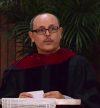- The Sunday Spanish worship service is held at St. Paul Lutheran Church in Lodi, Calif. Photos: Francisco Javier Goitía Padilla
- ELCA Southwest California Synod Bishop Guy Erwin helped lead the synod’s first Latino Pastors Learning Day last fall.
Last fall, I was invited to participate in the ELCA Southwest California Synod’s first Latino Pastors Learning Day. While in California, I visited Nelson Rabell-González’s congregation in Lodi. What follows is a journallike memory of the trip.
I arrived Thursday afternoon in Sacramento. Nelson Rabell-González, a good friend, picked me up at the airport. Nelson is a pastor at St. Paul Lutheran Church in Lodi, Calif., where he has been developing a Hispanic ministry among immigrant workers. From the airport, we went to Lodi, where Nelson showed me the town. Brown mountains dressed in sunny orange interrupted the flat line of the horizon. Vineyards covered both sides of the road. There were also almonds, onions, asparagus and strawberries.
“Javier, this is where my parishioners work,” Nelson told me. “The almonds use a lot of water. It is an issue.”
He knows his neighborhood. His sermons have shoes. We arrived at his church, where a group of Hispanic children, dressed in butterfly costumes, were rehearsing. Their mothers greeted me warmly. Nelson made sure everything was in order, and we hit the road to Glendale for the Latino pastors’ event.
We arrived at the ELCA Southwest California Synod office Friday morning. Synod Bishop Guy Erwin and Maria Paiva, coordinator for Latino ministry, had everything set. The bishop greeted the 20-plus pastors and seminarians from the three California synods and stayed with us the whole day.
We dialogued about God, being human, Jesus Christ and the Holy Spirit. We reviewed cherished Lutheran language and made doctrinal and theological connections: Revelation occurs in unexpected places and ways, such as the manger and vineyards by the side of the road, and in rooms of Hispanic children dressed in butterfly costumes. We as humans are sinners and saints at the same time. We are saints picking onions at night and sinners driving home at dawn. We suffer sin within and without—surging from our own being as selfishness and greed and enveloping us in society as racism and privilege. We know and worship God at the cross, not in defeat or dolorismo (the notion that suffering produces salvation) but as a grace-filled well. At the cross, God’s word is present for us.
The afternoon went by swiftly as we continued conversations about the complex particularities of Hispanic ministries. As I finished my last presentation, Maria invited the group to think about the future of this Latino theological learning day. We talked and prepared to go home. Nelson showed me Los Angeles, and we stayed at a hotel that night. Saturday morning, we left for Lodi.
Our Hispanic communities have a place and a future in our Lutheran community—not as saviors or scapegoats of a diminishing membership in a new ethnographic landscape, but as partners.
Driving in LA is awful! Stagnant traffic and long distances are routine for ELCA pastors on this side of the continent. Ministry needs to adjust to this everyday reality: We need to provide resources such as podcasts and audio texts that can be listened to and reflected upon while in transit. We got home late afternoon and talked about Sunday. Nelson’s wife, Fabiola, and kids greeted me warmly.
We got to church at midmorning on Sunday. I met Mark Price, a pastor at St. Paul who opened the doors there to Hispanic ministry and is very supportive of it. The Spanish worship service began at 12:30 p.m. Mark Holmerud, bishop of the Sierra Pacific Synod, presided at the table. He said the words of institution in Spanish!
Worship was vibrant. The energy of entire families participating filled the atmosphere. People worshiped in Spanish and prayed in English and Spanglish as various Hispanic generations gathered together. The voices of Lisa, Reyna and Britney led worship. Leadership there has a female face and voice as intelligent, committed and faithful teenagers—and their mothers—participate in worship and lead weekly activities.
What happened Friday at the Latino Learning Day with Bishop Erwin and Maria Paiva will certainly impact what happens Sundays and weekdays, as Nelson finds ways and opportunities to do ministry.
Our Hispanic communities have a place and a future in our Lutheran community—not as saviors or scapegoats of a diminishing membership in a new ethnographic landscape, but as partners in leadership and vocation as we find new ways and places to be church.
I returned to Chicago on Monday and drove to Wartburg Theological Seminary in Dubuque, Iowa, for a board meeting. Fall looks different in the Midwest. The landscape is different. The hills make the horizon line smoothly curved. Trees dressed in multicolored outfits replaced Hollywood Boulevard. Silos and livestock replaced vineyards. The Mississippi substitutes for the coast. No traffic jams!
Conversations are different, faces and accents are different, but God’s revelation continues to surprise and finds us in unexpected and nontraditional ways. It is the same church in both Lodi and Dubuque: the congregation of sinners and saints gathering around the means of grace, serving every neighbor in need in any corner of the world. ¡Gracias a Dios!







